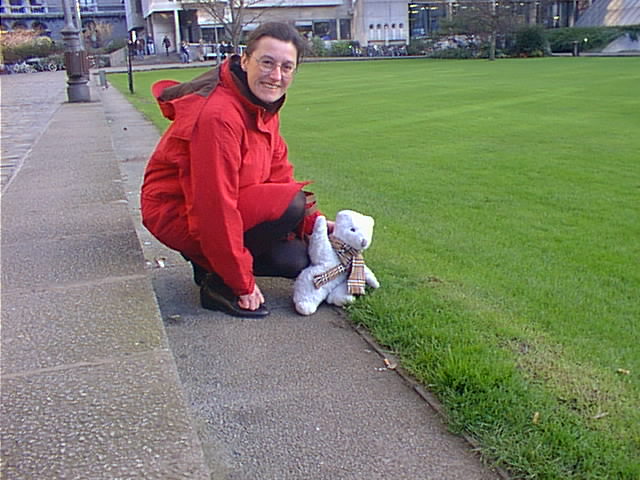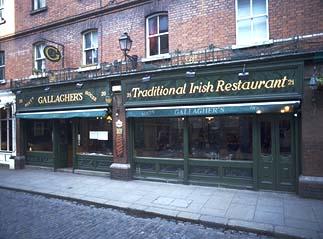"Can you imagine?" said Miss Cynthia to Doctor Steve. "Perry Bear took care of everything last night! He kept the babies safe, he wrote to Alexander—all by himself!" She smiled at me from over her shoulder.
It was morning and our last day in Dublin. William and Merri played together on the big bed. Miss Cynthia and Doctor Steve were getting ready for the day. I relaxed against my pillow. I had worked very hard the night before!
Miss Cynthia sat down on the bed next to me. "I am so proud of you, Perry!" she said. "Well done!" She ruffled my fur. I hid a smile beneath my paw. I was proud of me, too!
"Now," said Miss Cynthia, "what are we to do with these baby bears? We didn’t plan to bring little bears on this trip."
I looked at the baby bears. William tumbled sideways as Merri pushed against him. The babies giggled, then rolled to a stop. "Could we find a safe place for the babies to play during the day?" I asked. "They would keep each other company, if we just had someplace safe for them to stay."
"That’s a good idea, Perry" said Miss Cynthia. "What could we do to make a safe place for the babies?"
"Could we empty one of the suitcases?" I asked. "If we put a nice soft towel inside, the babies could play or sleep. There would be nothing for them to climb on, so they couldn’t get out and get lost!"
Miss Cynthia smiled. "Perry, you’ve done it!" she said. "That’s a great idea! A playpen for the baby bears. It will be just the thing."
And so it was. Soon, William and Merri were playing happily (and safely) in their own little suitcase-playpen. Miss Cynthia, Doctor Steve and I were on our way to see some last sights of Dublin.
"Where are we going today?" I asked. Once again, I was riding backward in my tote bag. "To see the Book of Kells!" called Miss Cynthia, over her shoulder.
I remembered what I had learned about the Book of Kells. It was made during the 8th century—the 700’s, AD. At that time, all Europe lived in the Dark Ages, a time when learning was scarce.
People worked too hard to grow enough food to learn to read or write. Important information about medicine and science, literature and art was forgotten, because there was no one to teach or to learn.
In Ireland, though, the light of learning stayed alive. Irish monks worked hard to preserve knowledge. Books were copied by hand and called manuscripts. The finest and most beautiful books were "illuminated". They were illustrated with beautiful drawings and pictures.
Of these, the most beautiful and ornate was the Book of Kells. Oh, it had an eventful life! Many, many monks worked for years to create the large, intricate manuscript. Each tiny picture took many days to complete.
About 300 years later, a disaster happened! In 1007, the Book of Kells was stolen from its monastery. Three months later, the Book was miraculously recovered from a bog. The gold covers were missing, but the important manuscript had not been harmed.
 Today, the Book of Kells lives at Trinity College, Dublin—and we were there! Miss Cynthia and I looked at the big front door. Students and visitors hurried in and out between one world and another.
Today, the Book of Kells lives at Trinity College, Dublin—and we were there! Miss Cynthia and I looked at the big front door. Students and visitors hurried in and out between one world and another.
Outside, the city pushed and rattled. Inside, the college was green and quiet. Beautiful old buildings sat surrounded by bright green grass. I leaned down to touch the grass, to see if it was real! Students hurried along quiet paths. Trinity College was a beautiful place, a quiet place of learning set in the heart of a busy city.
The Book of Kells lived in the building housing the Old Library. In the 18th century, Trinity College built a special place to house all the old books. We climbed up narrow stairs into this special room.
 Oh! What a treat for a bear who loved books! The Old Library was a long, arched room, lined floor to ceiling with rare old books. Along each long wall, narrow niches surrounded tall windows. Each niche was filled with old leather volumes. The tallest books were at the bottom of the shelf. To reach the smallest books, you had to climb a ladder way, way to the top.
Oh! What a treat for a bear who loved books! The Old Library was a long, arched room, lined floor to ceiling with rare old books. Along each long wall, narrow niches surrounded tall windows. Each niche was filled with old leather volumes. The tallest books were at the bottom of the shelf. To reach the smallest books, you had to climb a ladder way, way to the top.
Doctor Steve said he wanted a library just like the Old Library. Miss Cynthia laughed. I looked at the long rows of books, and thought about all the work and thought that they contained. Ouch! It made my head-stuffing ache, just to think of it.
Downstairs, in a special museum, lay the Book of Kells. It was enclosed in a glass case, so visitors could lean close and see the tiny details of the illuminations. The Book was so old, and yet so beautiful.
"Perry, each day the museum’s curator turns the Book to a new page" said Miss Cynthia.
Night was falling as we left Trinity College. Doctor Steve was hungry! We decided to find a cab and visit the area of Dublin known as Temple Bar. There would be many restaurants there. Doctor Steve could have his dinner.
Dublin cabdrivers are very, very friendly. Miss Cynthia and our cabdriver chatted about books and writers and bears. "Do you know that we met another writer’s bear?" asked Miss Cynthia.
Our cabdriver let us out at the edge of the Temple Bar district. "Have a good night, luv!" called the cabdriver. Miss Cynthia watched him drive away. "Wasn’t that nice," she said. "In England, they ignore you and call you stuffy old ‘Madam’. Here, cabbies talk about books and writers and call you ‘luv’. I like Ireland!"
We walked toward a special restaurant: Gallagher’s Boxty House. We would eat traditional Irish food. "Boxty?" asked Doctor Steve. "What’s boxty?
"Don’t worry about what it is," said Miss Cynthia. "You’ll like it!" As we walked down the narrow street, Miss Cynthia sang a little rhyme:
"Boxty on the griddle,
and boxty in the pan.
If ye can't make boxty,
ye'll never get a man!"
Doctor Steve frowned. Miss Cynthia gave in. "All right, I’ll tell you. Boxty is a potato pancake. It’s grilled until it’s light and tender, and you put different fillings inside it."
"Oh, a potato pancake!" said Doctor Steve. "Good. I like potatoes." He smiled and walked with a lighter step. Boxty sounded good to me, too! There were rumbles in my plump little bear tummy.
Would you like to try boxty? There is a recipe here. It is delicious!

Gallagher’s Boxty House ahead—but look at the line! Doctor Steve squeezed between the happy, chattering people, and spoke to the host. "It’ll be an hour, he says," said Doctor Steve. "Shall we wait!"
"Sure!" said Miss Cynthia. "Let’s wait in the pub across the street." Doctor Steve left our name, and we went to the pub. In Ireland, pubs are places where people gather in the evening to have fun. It’s an adult’s place; there were no children.
Miss Cynthia stepped inside the pub. The ceiling was low and the room was dark. It was full of people laughing and chatting and smoking cigarettes. "Perry, you’re getting a real Irish experience tonight," she said.
Doctor Steve bought drinks, and we squeezed through to a clear stretch of table. Everyone was cheery and noisy. Pop music played in the background.
Miss Cynthia and Doctor Steve sipped their drinks and looked about happily. Young people sang along with the music. An older man read book and ate a sandwich. Two women talked earnestly, heads together over the table.
Miss Cynthia grabbed Doctor Steve’s coat. "Look!" she said, " A bard!" A young man had entered the pub and was walking from group to group. We listened as he spoke to the group next to us. For two pounds (about $3) the bard would recite a poem.
Miss Cynthia beckoned to the bard. She gave him two one-pound coins, and he handed her a little book of poetry. In a loud voice, he began to recite:
"The time before, the time again
I said I would, so here I am
Back from then, and then is now
I don't know why, I don't know how"
Doctor Steve looked puzzled, but Miss Cynthia was happy. "Perry," she explained, "a bard is someone who is a singer, a poet or a writer. A bard travels from place to place, entertaining and teaching with his art."
In Ireland, Miss Cynthia explained, it’s an honor to be a patron to a bard. For much of Ireland’s history, the Irish were forbidden to learn. Irish children were not allowed to go to school. Irish young people could not go to University.
During those dark years, bards helped keep Irish learning alive. They traveled from village to village, singing songs and reciting poems. Songs and poems and stories kept Irish history from being forgotten. Learning was shared, even if there were no schools.
Sometimes, traveling poets and singers and writers were "hedge teachers." During the years of English oppression, the Irish set up secret schools, called hedge schools. Classes often met right by the road, underneath a hedge! Hedge teachers traveled to teach children and adults. It was dangerous. If they were caught, they would be punished.
That’s why, Miss Cynthia explained, poets and writers and storytellers are so respected in Ireland. They had a big role in preserving the Irish people’s knowledge and history and learning.
Doctor Steve looked at his watch. "Time to eat!" he said. I was glad! I liked the pub, but my tummy-rumbles were too loud to ignore.
Soon we were seated at a long table at Gallagher's Boxty House, next to a bright warm fire. Everyone ate like a family, all together at the same table. An Irish man and two women shared one end of our table. Doctor Steve smiled as he gave our order. Lamb boxty, mixed boxty and Gallagher’s special boxty, coming right up!
Would you like to visit Gallagher's Boxty House? They are on the Web here.
I stretched out my paws as far as they would go. Sight-seeing could make you sleepy! I spooned up my boxty in between yawns. It was delicious—but I was a very tired teddy bear. The warm glow from the fire made me want to sleep. One more bite . . . and another . . . and I lay my head on Miss Cynthia’s lap.
Warm and full, I thought about our day. Bears and books, bards and boxty. I like Ireland, I thought, as my eyes slid down into sleep.
Good night, luv! Sweet dreams, Perry Bear!
Perry's Travels: